Python1作业
1. 人生苦短,我学python
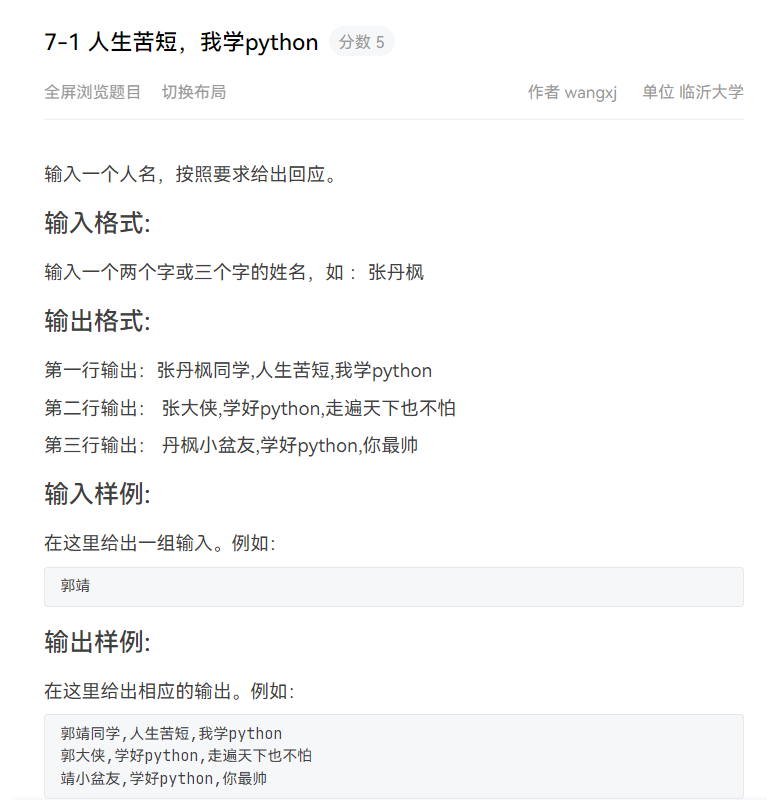
name=input()
print("{}同学,人生苦短,我学python".format(name))
print("{}大侠,学好python,走遍天下也不怕".format(name[0]))
print("{}小盆友,学好python,你最帅".format(name[1:]))
2. 汇率兑换
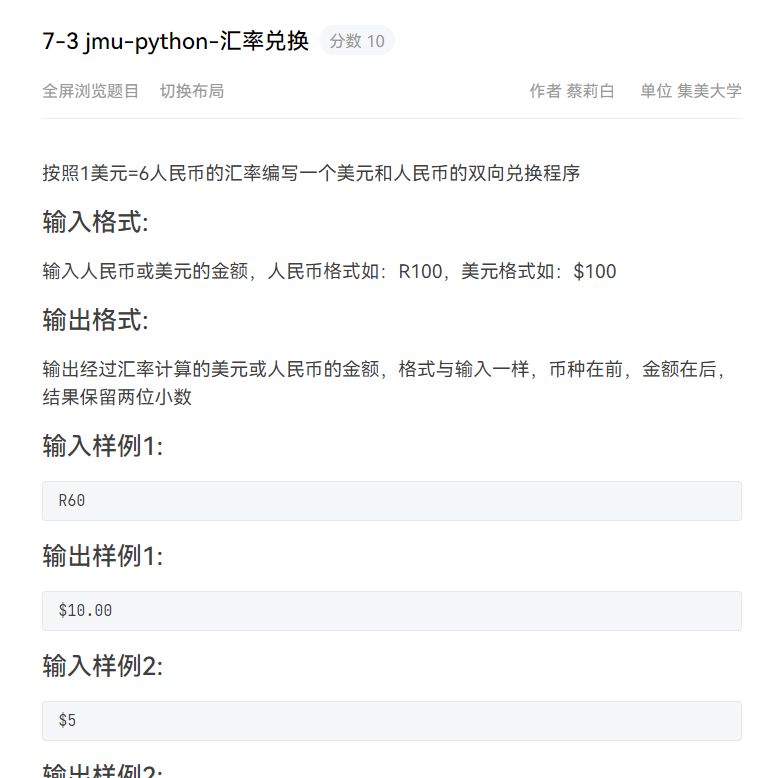
money=input()
if money[0] == 'R':
U=eval(money[1:])/6
print("$%.2f" % U)
elif money[0] == '$':
R=6*eval(money[1:])
print("R%.2f" %R)
3. 求圆面积
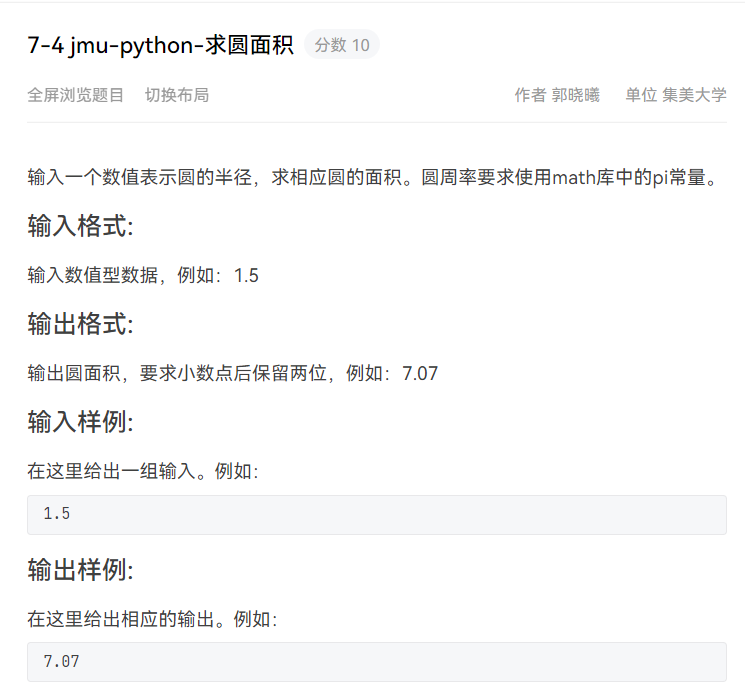
import math
a = eval(input())
print("%.2f" % (math.pi*(a**2)))
Python2作业
函数题
1.求m到n之和
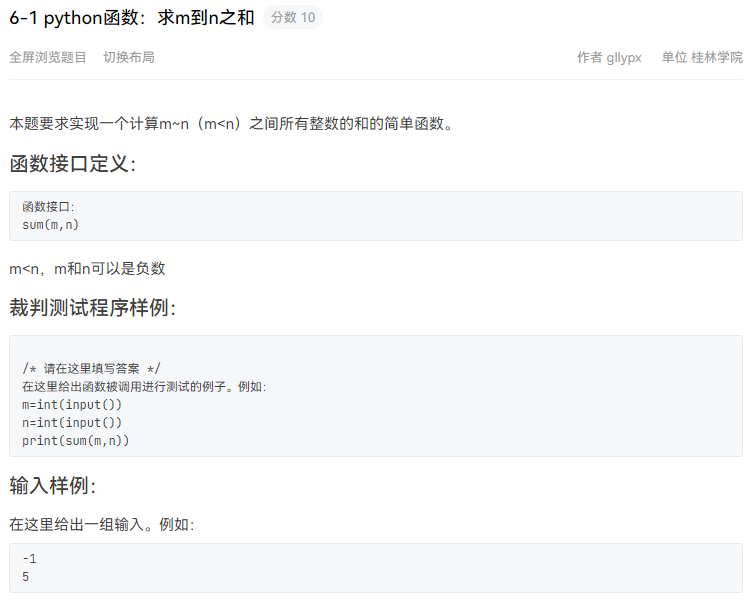
def sum(m,n):
s = 0
if m < n:
for i in range(m, n+1):
s = s + i
return s
2. 递归求斐波那契数列
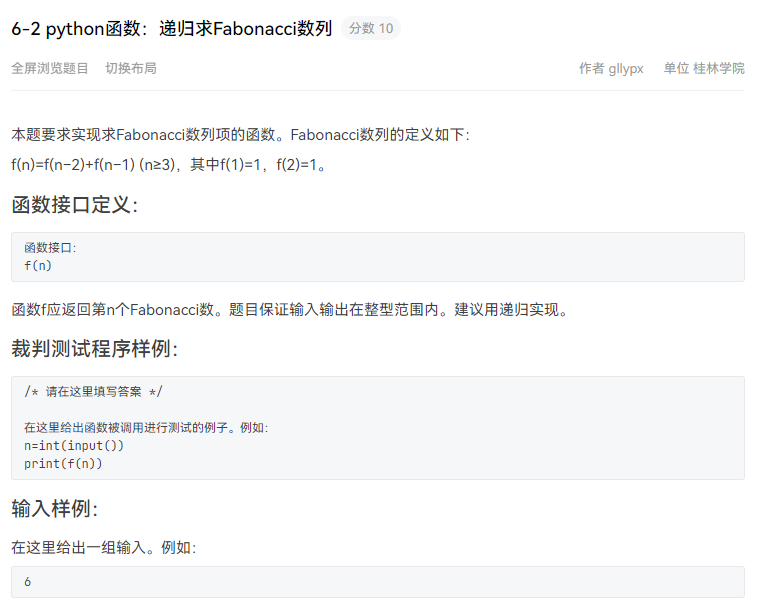
def f(n):
if n == 0:
return 0
if n == 1 or n == 2:
return 1
else:
return f(n-2) + f(n-1) //递归
编程题
1. 企业根据利润提成发放奖金问题
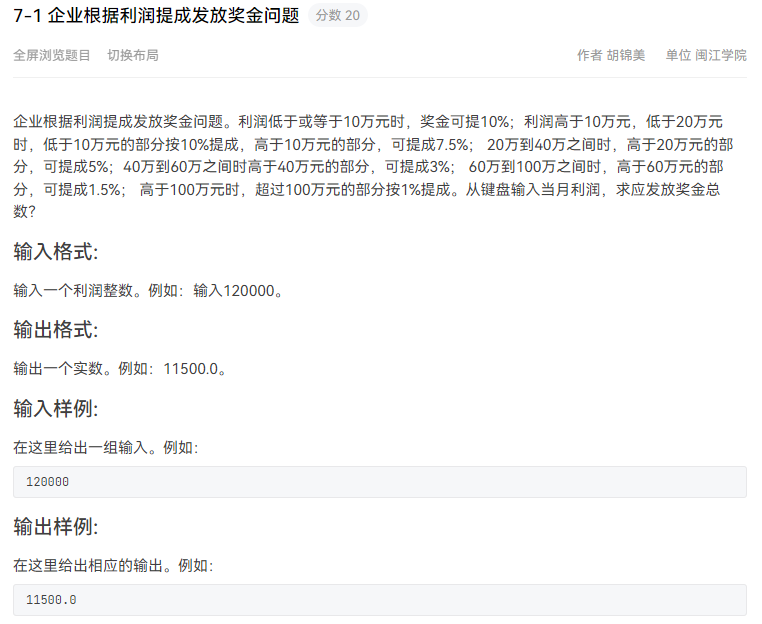
a = int(input())
b = [1000000,600000,400000,200000,100000,0]
c = [0.01,0.015,0.03,0.05,0.075,0.1]
r = 0
for i in range(0,6):
if a>b[i]:
r+=(a-b[i])*c[i] //计算超出部分应发奖金
a=b[i] //重置计算标准
print(r)
2. 计算某天距元旦的天数
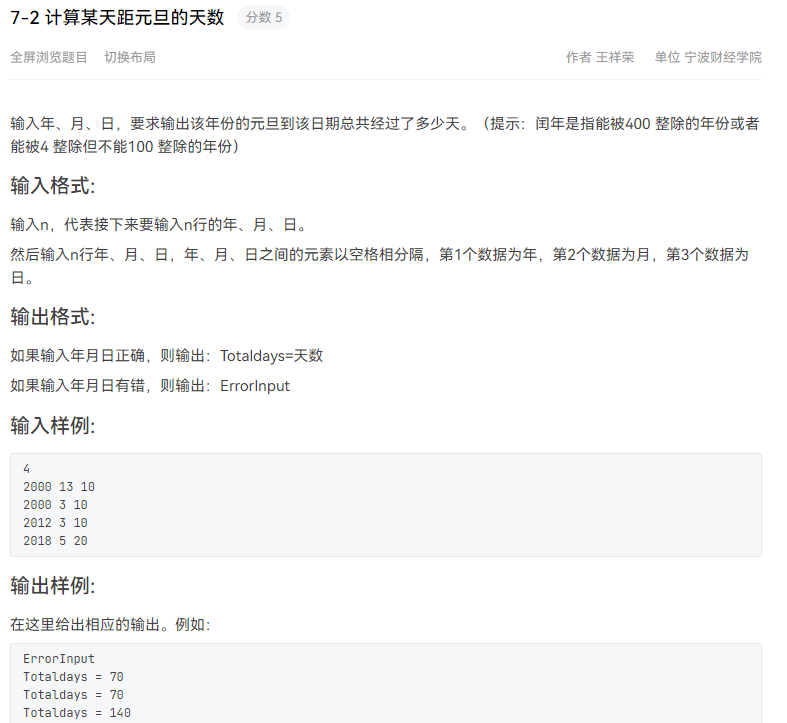
Leap = (31, 29, 31, 30, 31, 30, 31, 31, 30, 31, 30, 31)
DisLeap = (31, 28, 31, 30, 31, 30, 31, 31, 30, 31, 30, 31) #闰年月份天数
result = []
def dayNum(num):
for i in range(num):
str1 = input()
date = str1.split(' ') #将字符串以空格划分
try:
year = int(date[0])
month = int(date[1])
day = int(date[2])
if year % 400 == 0 or year % 4 == 0 and year % 100 != 0: #判断闰年
if month <= 12 and month > 0 and day > 0 and day <= Leap[month - 1]:
res = 0
for j in range(month - 1): # month - 1
res += Leap[j]
res += day
result.append("Totaldays = " + str(res))
else:
result.append("ErrorInput")
else:
if month <= 12 and month > 0 and day > 0 and day <= DisLeap[month - 1]:
res = 0
for j in range(month - 1):
res += DisLeap[j]
res += day
result.append("Totaldays = " + str(res))
else:
result.append("ErrorInput")
except:
result.append("ErrorInput")
for k in result:
print(k)
n = eval(input())
if n >= 0:
dayNum(n)
3. 温度转换
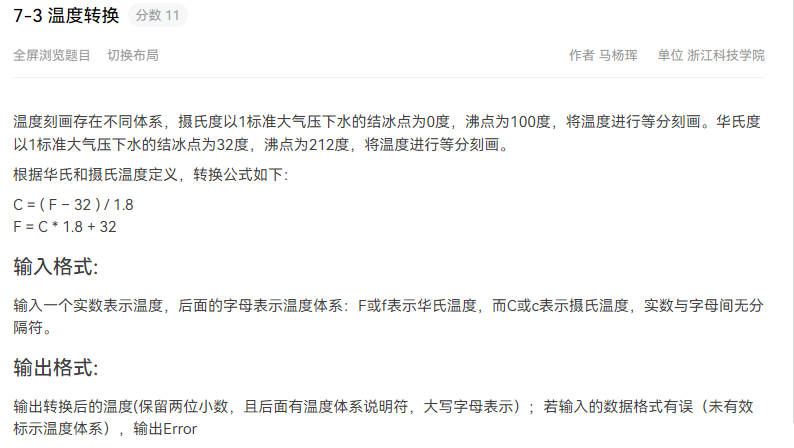
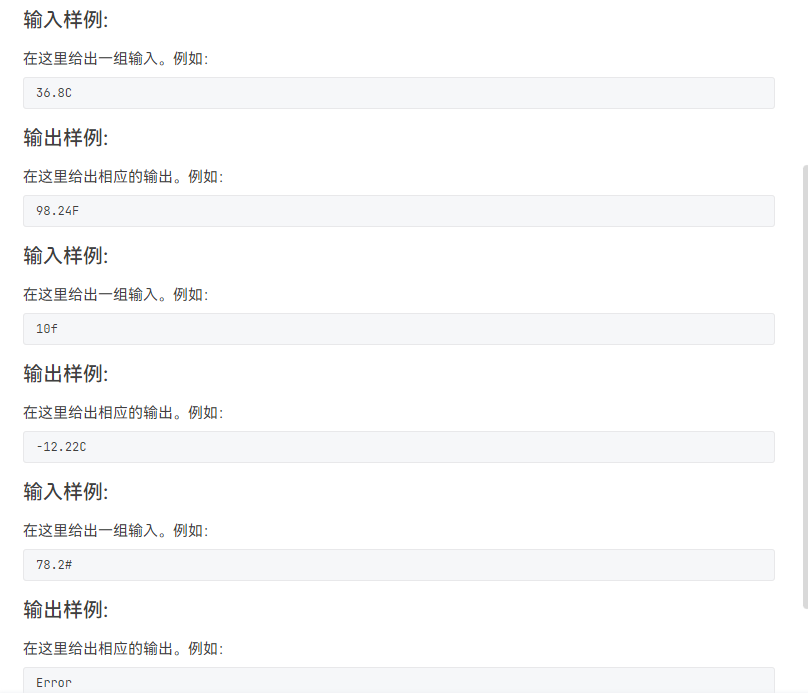
c = input()
ctype = c[-1] #[-1]指向字符串最后一个字符
if ctype == 'F' or ctype == 'f':
print("%.2fC" % ((float(c[0 : -1]) - 32) / 1.8)) #c[0:-1] 从0到倒数第一个字符,但不包括最后一个
elif ctype == 'C' or ctype == 'c':
print("%.2fF" % (float(c[0 : -1]) * 1.8 + 32))
else:
print("Error")
4. 3,5,7的倍数判定
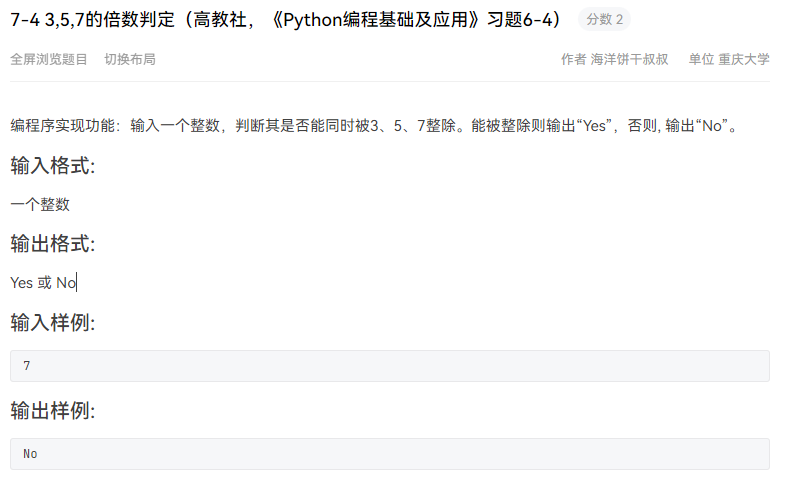
n = int(input())
if n % 3 == 0 or n % 5 == 0 or n % 7 == 0:
print("Yes")
else:
print("No")
5. 计算分段函数f(x)的值
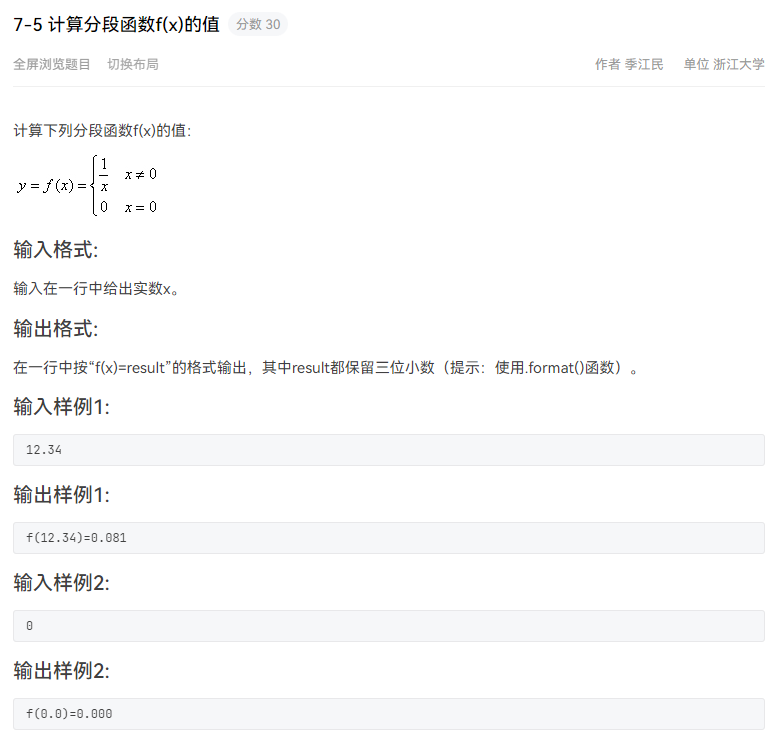
n = float(input())
if n == 0:
print("f(0.0)=0.000")
else:
print("f({:.2f})={:.3f}".format(n, 1/n))
6.统计字符串中不同种类的字符个数
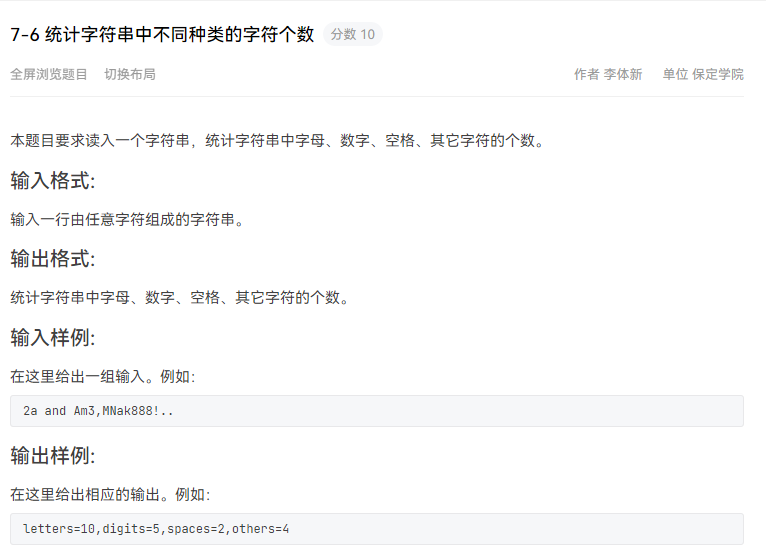
letter = 0
digits = 0
spaces = 0
other = 0
str0 = input()
for i in str0:
if i.isalpha(): #判断是不是字符串 .isalpha()方法
letter+=1
elif i.isdigit(): #判断是不是数字 .isdigit()方法
digits+=1
elif i.isspace(): #判断是不是空格 .isspace()方法
spaces+=1
else:
other+=1
print('letters=%d,digits=%d,spaces=%d,others=%d'%(letter,digits,spaces,other))
Python 实验1
4. 重复多个星号
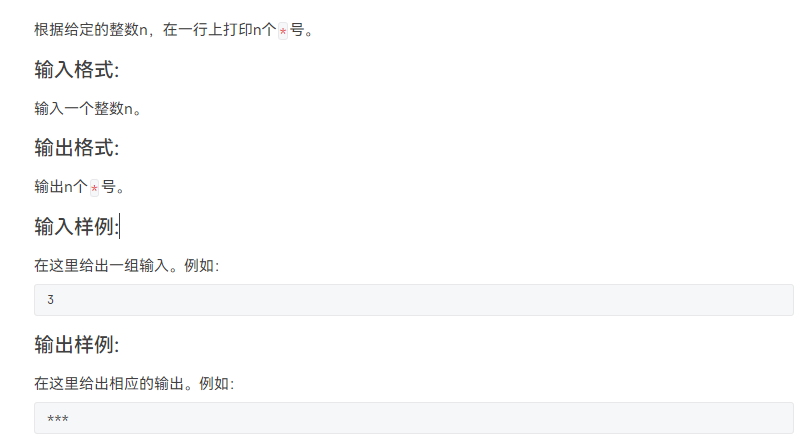
a = int(input())
s = ""
for n in range(a):
s += "*"
print(s)
5. 输入半径(大于0),计算圆面积
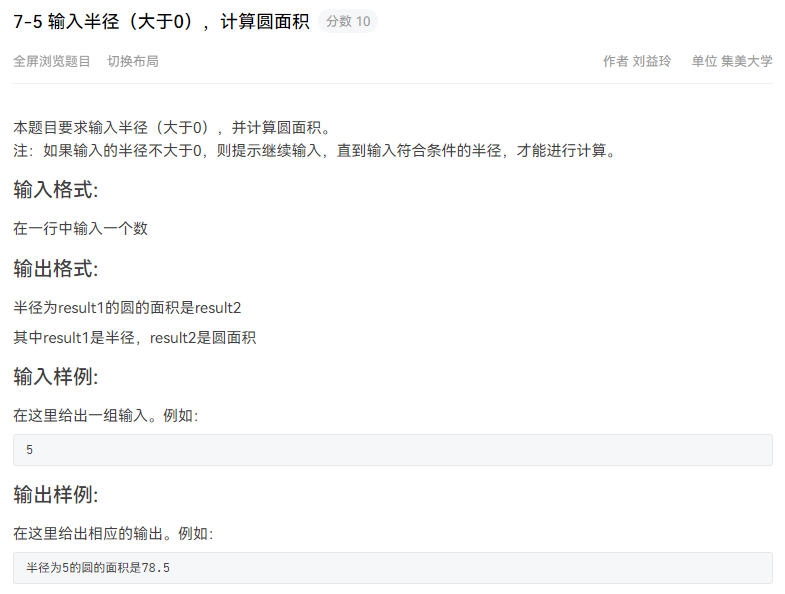
n = float(input())
while n <= 0:
n = float(input())
s = 3.14 * n * n
print('半径为{:g}的圆的面积是%0.1f' . format(n) %s)
6. 按格式输出日期
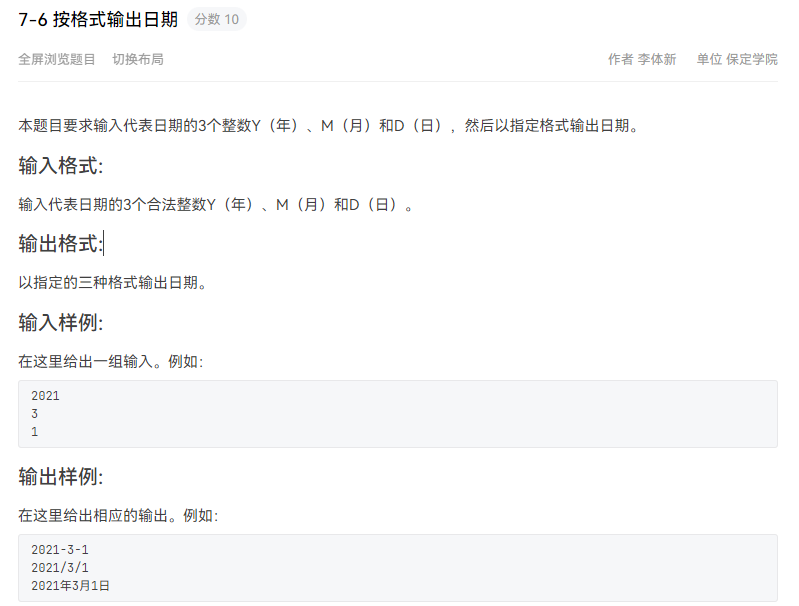
y = int(input())
m = int(input())
d = int(input())
if m < 13 and d < 32 and m > 0 and d > 0: #判断输入是否合法
print("{}-{}-{}" .format(y, m, d))
print("{}/{}/{}" .format(y, m, d))
print("{}年{}月{}日" .format(y, m, d))
7. 华氏温度到摄氏温度的转换
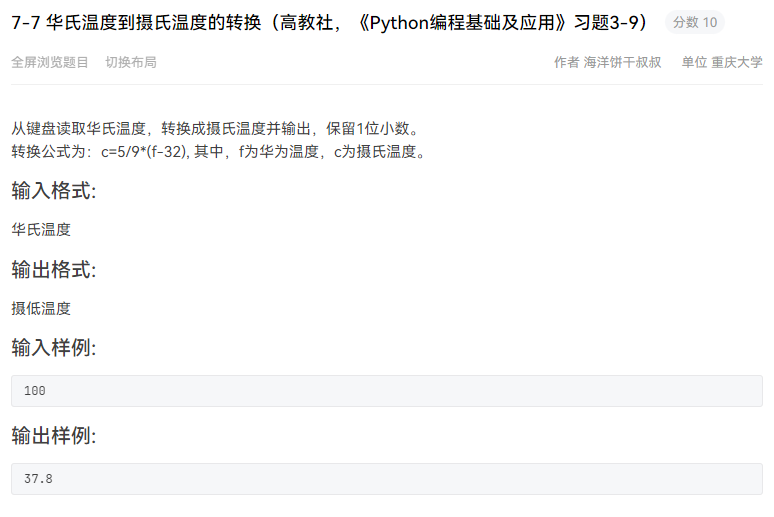
f = float(input())
c = 5/9*(f-32)
print("%.1f" % c)
8. 比较大小
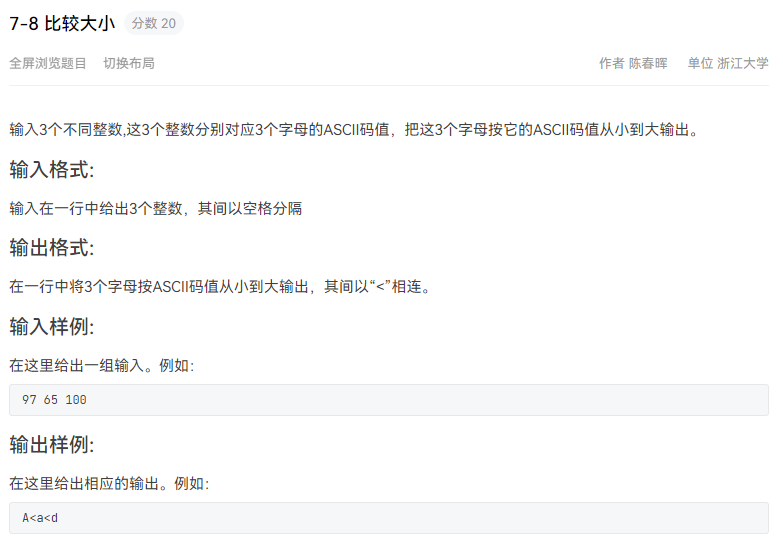
numlist=sorted(list(map(eval, input().split())))
print("{:c}<{:c}<{:c}".format(numlist[0], numlist[1], numlist[2]))
9. 统计字符串中子串出现的次数
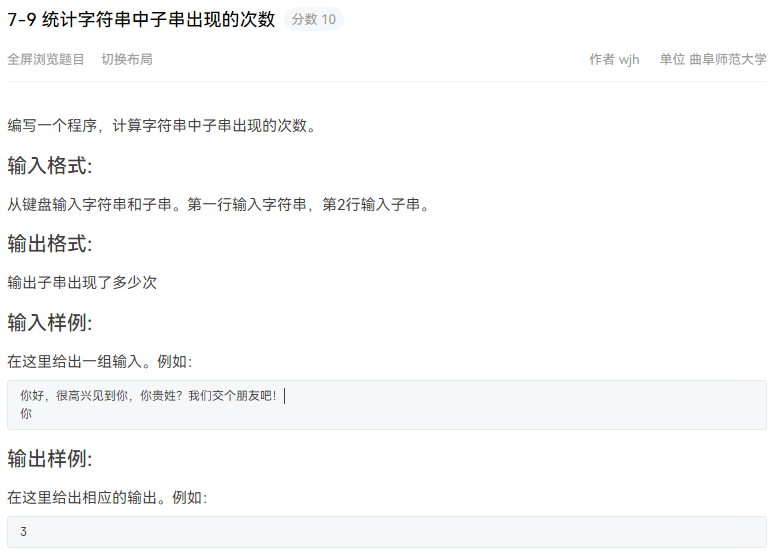
str1 = input()
str2 = input()
ncount = str1.count(str2) #count函数是Python的字符串函数。用于统计字符串中某字符出现的次数。
print(ncount)
Python 实验2
1. 判断点在圆内圆
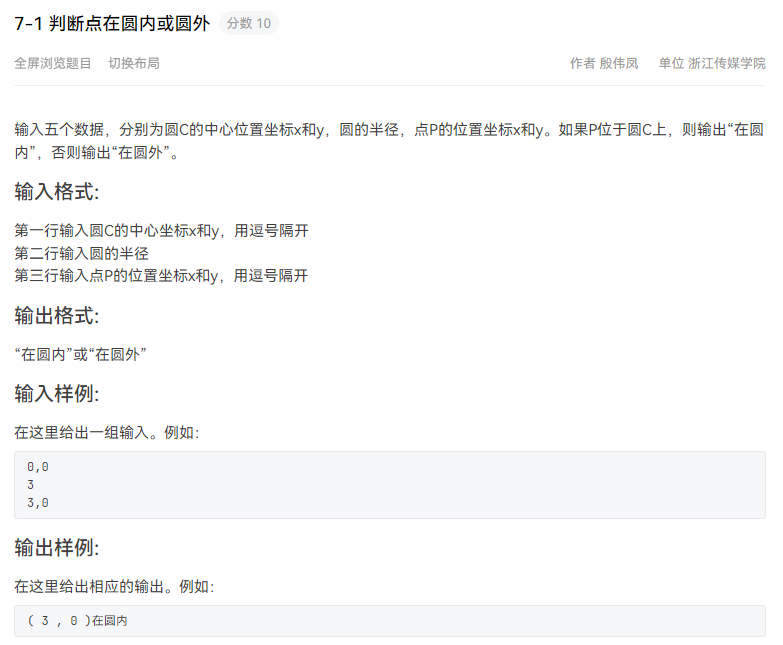
x, y = input().split(',')
x, y=eval(x), eval(y)
r = float(input())
x1, y1 = input().split(',')
x1, y1=eval(x1), eval(y1)
if (x - x1)**2 + (y - y1)**2 > r**2:
print("( {} , {} )在圆外".format(x1, y1))
else:
print("( {} , {} )在圆内".format(x1, y1))
2. 身体质量指数
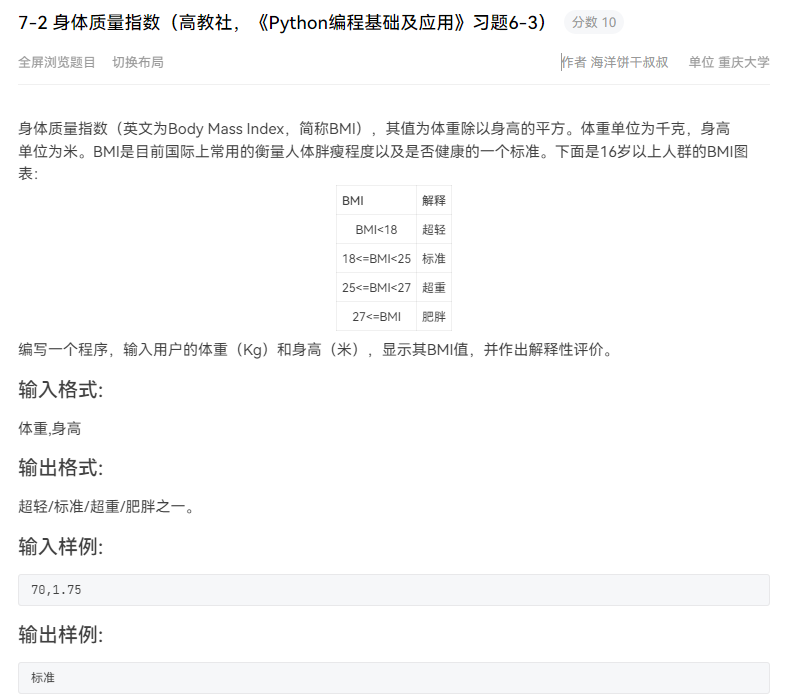
x, y = input().split(',')
x, y = eval(x), eval(y)
BMI = x / (y**2)
if BMI < 18:
print("超轻")
elif BMI <= 25:
print("标准")
elif BMI <= 27:
print("超重")
else:
print("肥胖")
3. 两个给定正整数的最大公约数和最小公倍数
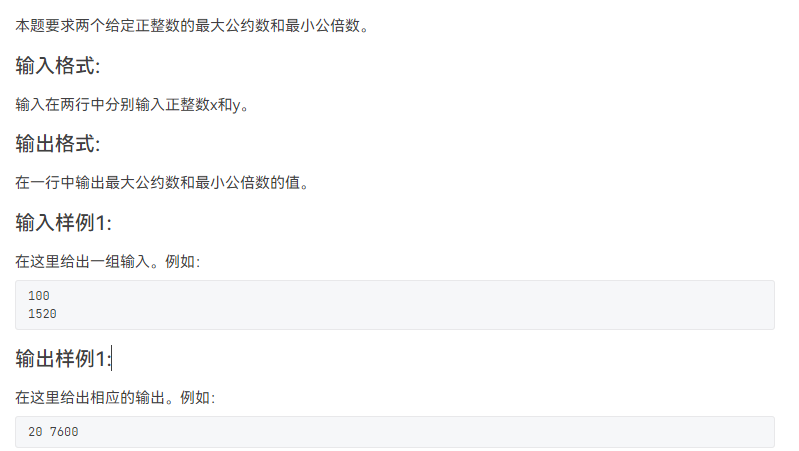
x = int(input())
y = int(input())
def gcd(x1, y1): #最大公约数
m = max(x1, y1)
n = min(x1, y1)
while m % n:
m, n = n, m % n
return n
def lcm(x2, y2): #最小公倍数
m = max(x2, y2)
n = min(x2, y2)
while m % n:
m, n = n, m % n
return x2 * y2 // n #二者只是最后一步不同
print("{} {}".format(gcd(x, y), lcm(x, y)))
4. X教授决策成绩评定
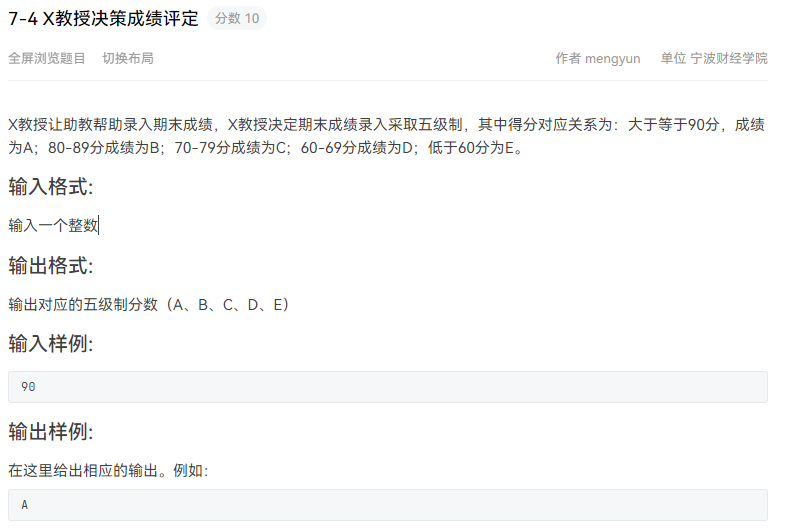
a = int(input())
if a < 60:
print("E")
elif a < 70:
print("D")
elif a < 80:
print("C")
elif a < 90:
print("B")
else:
print("A")
5. 统计输入字符个数
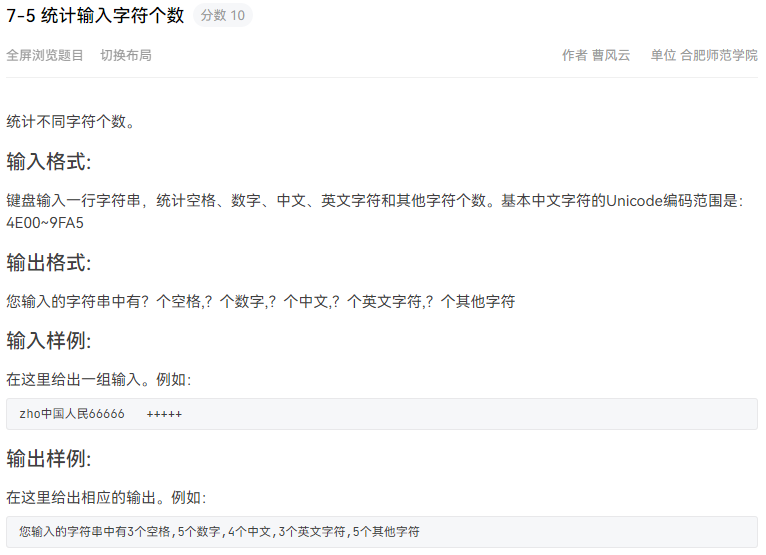
str = str(input())
eng=num=bla=oth=zh=0
for i in str:
if (ord(i)>=97 and ord(i)<=122) or (ord(i)>=65 and ord(i)<=90): #ord() 将字符转为ASCII值,并返回值
eng=eng+1
elif ord(i)>=48 and ord(i)<=57:
num=num+1
elif ord(i)==32:
bla=bla+1
elif 0x4e00 <= ord(i) <= 0x9fa5:
zh=zh+1
else:
oth=oth+1
print('您输入的字符串中有{}个空格,{}个数字,{}个中文,{}个英文字符,{}个其他字符'.format(bla,num,zh,eng,oth))
6. 判断是否为3和5的倍数
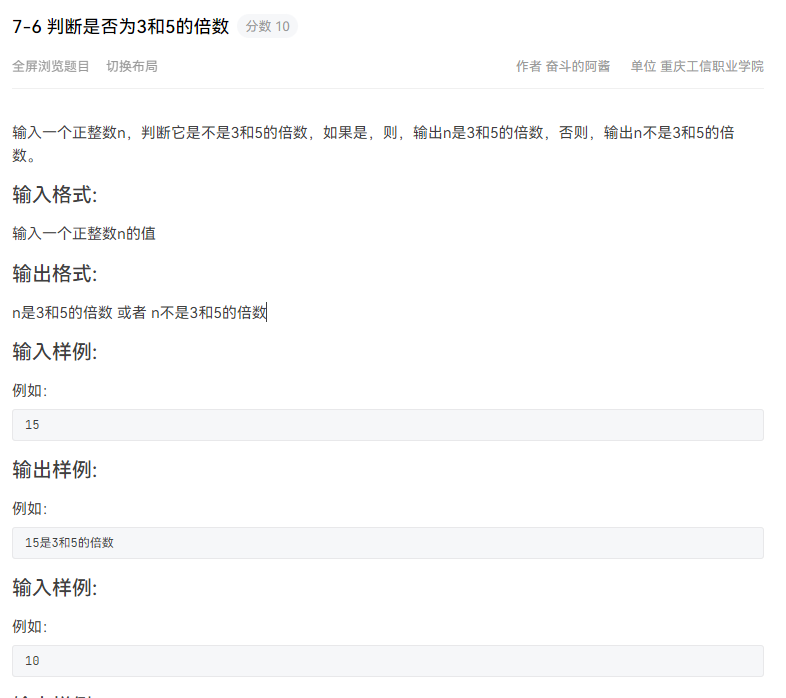
a = int(input())
if a % 3 == 0 and a % 5 == 0:
print("{}是3和5的倍数".format(a))
else:
print("{}不是3和5的倍数".format(a))
7. 天天向上的力量
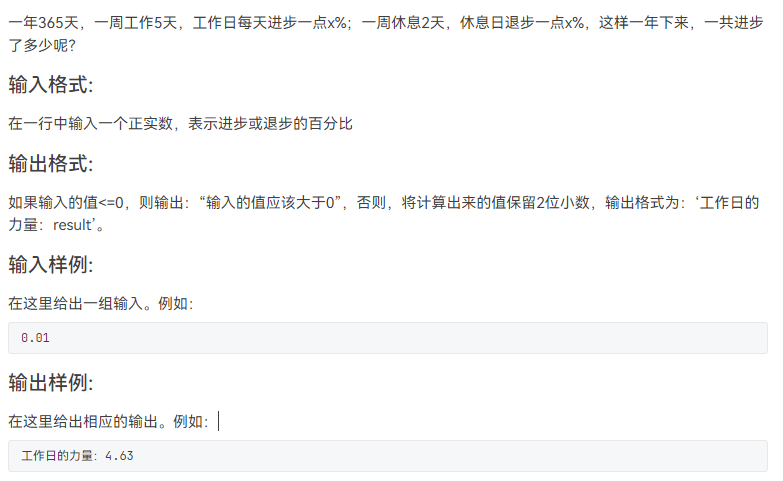
dayup = 1.0
dayfactor = float(input())
if dayfactor > 0:
for i in range(365):
if i % 7 in [6, 0]:
dayup = dayup * (1 - dayfactor)
else:
dayup = dayup * (1 + dayfactor)
print("工作日的力量:{:.2f}".format(dayup))
else:
print("输入的值应该大于0")
8. 百钱百鸡
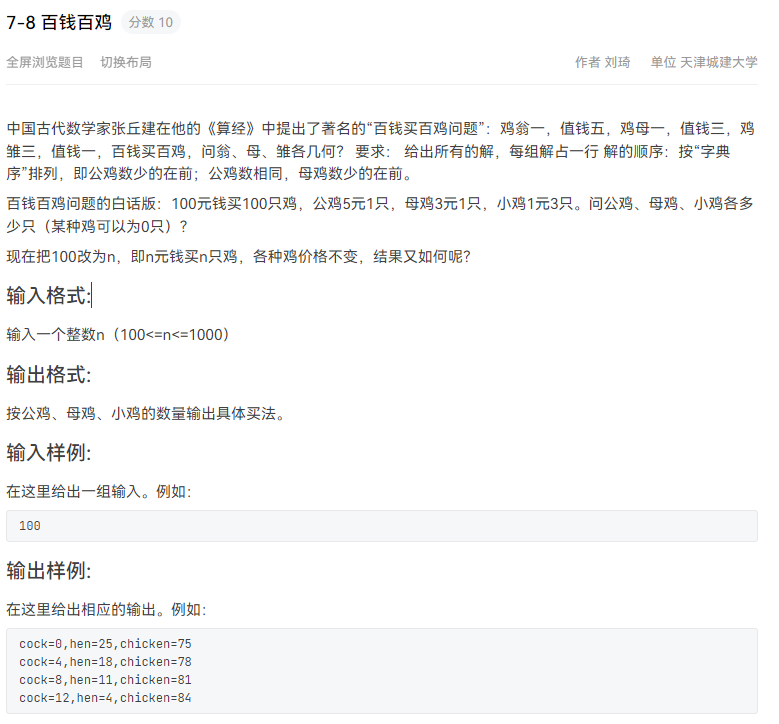
n = int(input()) #鸡的总数
for a in range(n): # a公鸡的总数
for b in range(n): #b 母鸡的总数
c = n - a - b #c 小鸡的总数
if a*5+b*3+c/3 == n and c%3==0:
print('cock={},hen={},chicken={}'.format(a, b, c))
9. 三七二十一
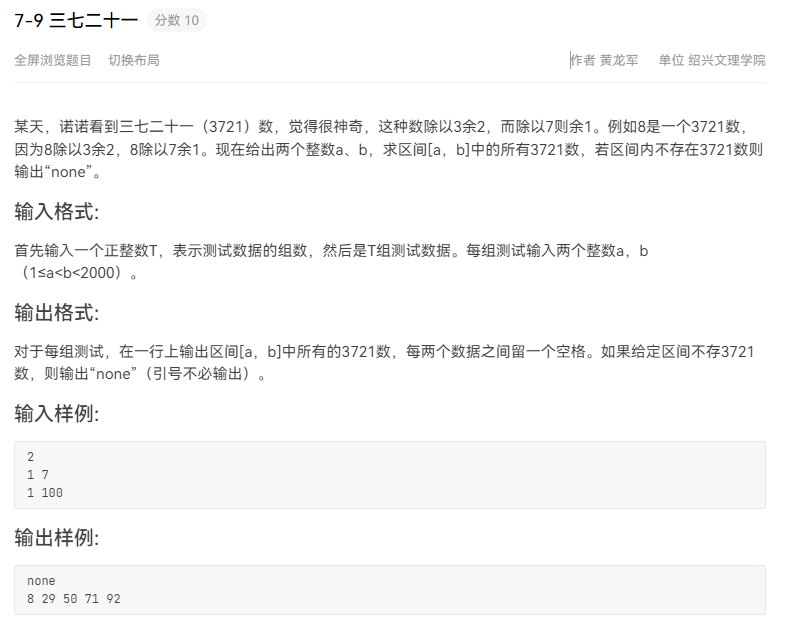
n = int(input())
for i in range(n):
sum = 0
m1, m2 = map(int, input().split())
for i in range(m1, m2 + 1):
if i % 3 == 2 and i % 7 == 1:
if sum >= 1:
print(" %d" % i, end='')
else:
print(i, end='')
sum += 1
if sum == 0:
print("none")
else:
print()
10. 亲和数的判断
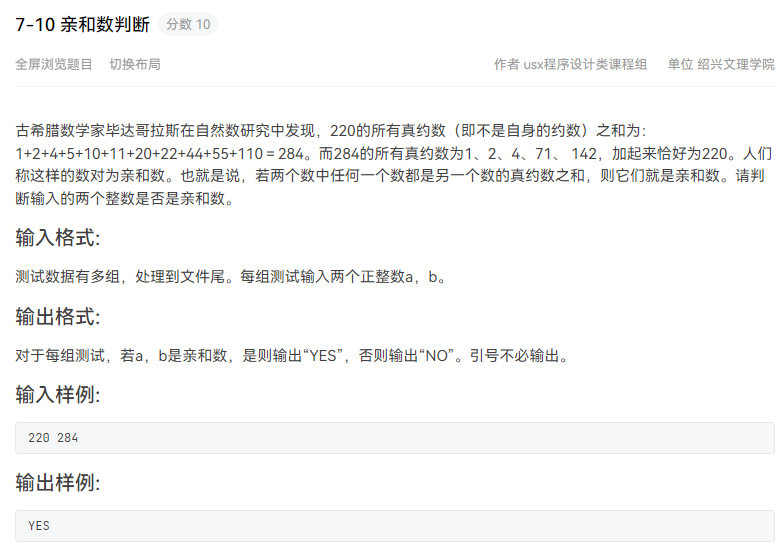
try: #注意异常处理 try: except EoFError
while True:
a, b = input().split()
a = int(a)
b = int(b)
sum0 = 0
sum1 = 0
for i in range(1, a):
if a % i == 0:
sum0 = sum0+i
for y in range(1, b):
if b % y == 0:
sum1 = sum1+y
if sum0 == b and sum1 == a:
print("YES")
else:
print("NO")
except EOFError:
pass
注意异常问题
Python 实验3
1. 求整数的位数以及各位数字之和
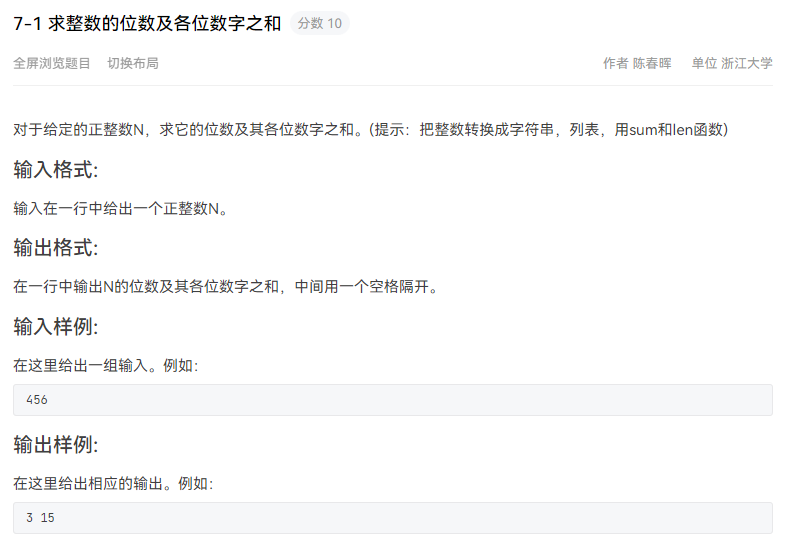
n=input()
num=list(n)
print(len(num),sum(int(i) for i in num))
2. 任意多行字符串拆分数值求和
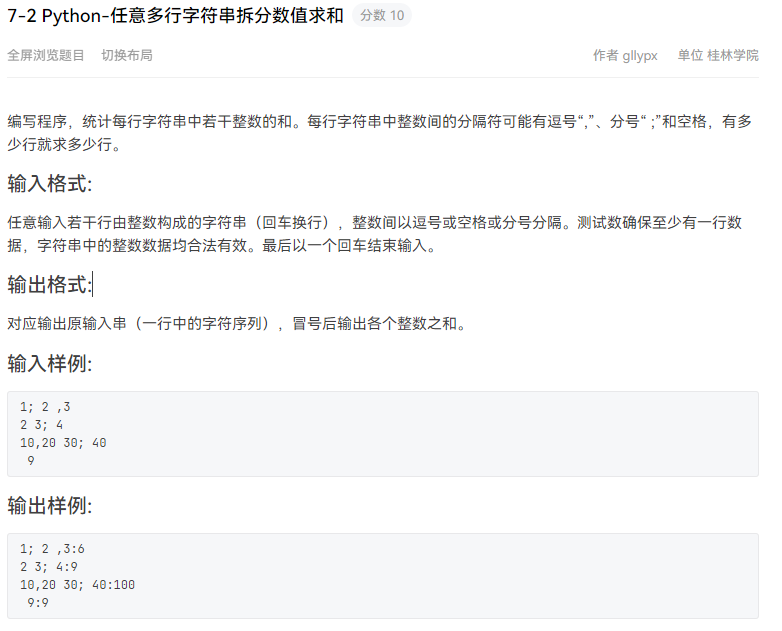
try:
while True:
str1 = input()
str2 = ''
for i in str1:
if i.isdigit():
str2 += i #将所有数字串进行提取
else:
str2 += ' ' #用空格代替字符,并对数字串进行划分
list1 = list(map(int, str2.split())) # 将数字字符串进行划分 调整为list列表
print("%s:%s"%(str1,sum(list1)))
except EOFError:
pass
3. 数据提取
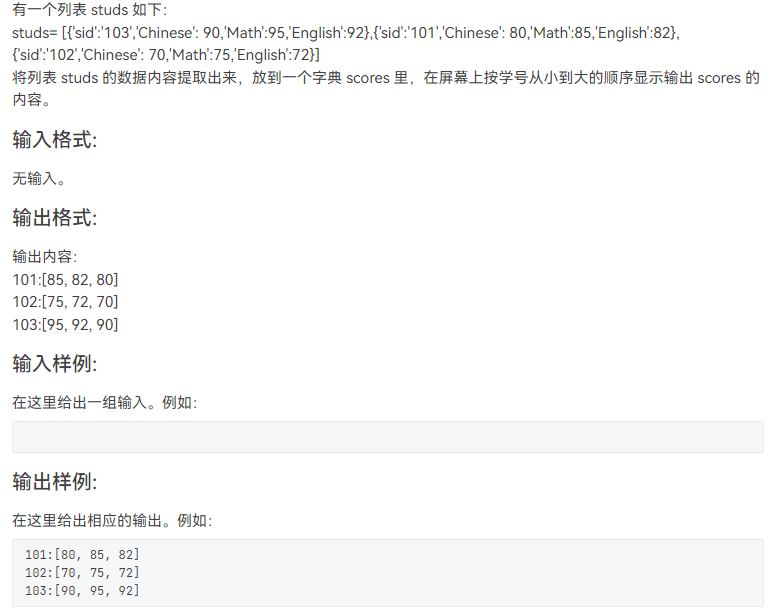
studs= [{'sid':'103','Chinese': 90,'Math':95,'English':92},{'sid':'101','Chinese': 80,'Math':85,'English':82},{'sid':'102','Chinese': 70,'Math':75,'English':72}]
scores = {}
for stud in studs:
sv = stud.items()
v = []
for it in sv:
if it[0] =='sid':
k = it[1]
else:
v.append(it[1])
scores[k] = v
so = list(scores.items())
so.sort(key = lambda x:x[0],reverse = False)
for l in so:
print('{}:{}'.format(l[0],l[1]))
4. 汉字表示的大写数字金额
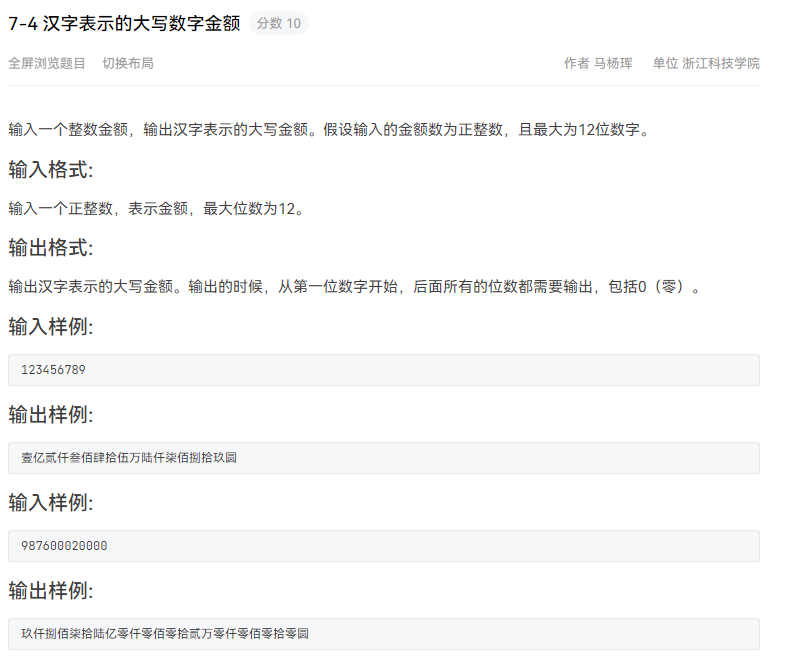
s=str(input())
s=list(s)
length=len(s)
zd={0:"零",1:"壹",2:'贰',3:'叁',4:'肆',5:'伍',6:'陆',7:'柒',8:'捌',9:'玖'}
for i in range(len(s)):
print(zd[ord(s[i])-48],end="")
if len(s)-i==9:
print("亿",end="")
continue
if len(s)-i==5:
print("万",end="")
continue
if (len(s)-i)==7 or (len(s)-i)==3 or (len(s)-i)==11:
print("佰",end="")
elif (len(s)-i)==8 or (len(s)-i)==4 or (len(s)-i)==12:
print("仟",end="")
elif (len(s)-i)==6 or (len(s)-i)==2 or (len(s)-i)==10:
print("拾",end="")
print("圆")
5. 字母替换
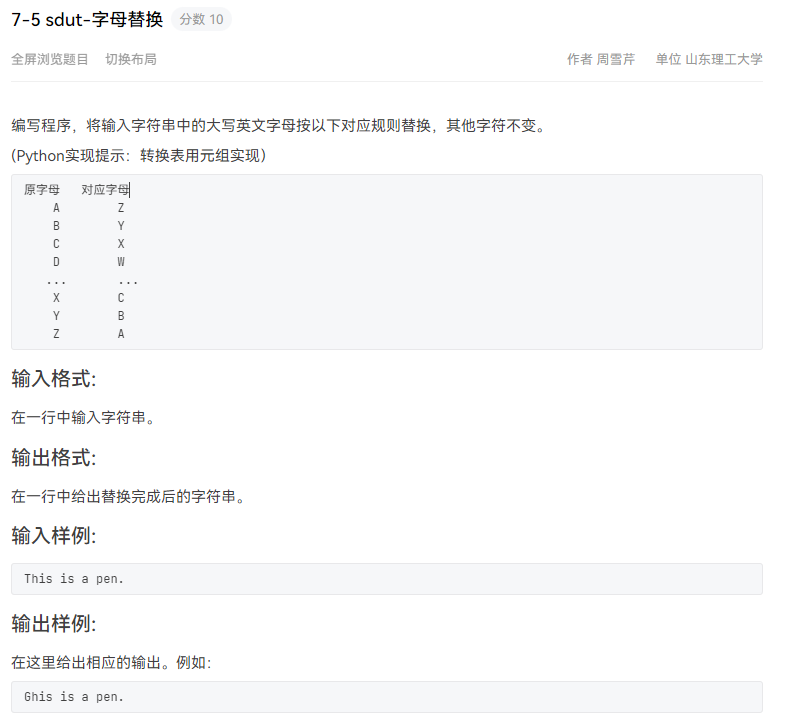
s=input()
for i in s:
if i.isupper(): #.isupper()如果是大写字母,返回True
tmp1=ord(i)-65
tmp2=90-tmp1
i=chr(tmp2)
print(i,end="")
6. 查验身份证
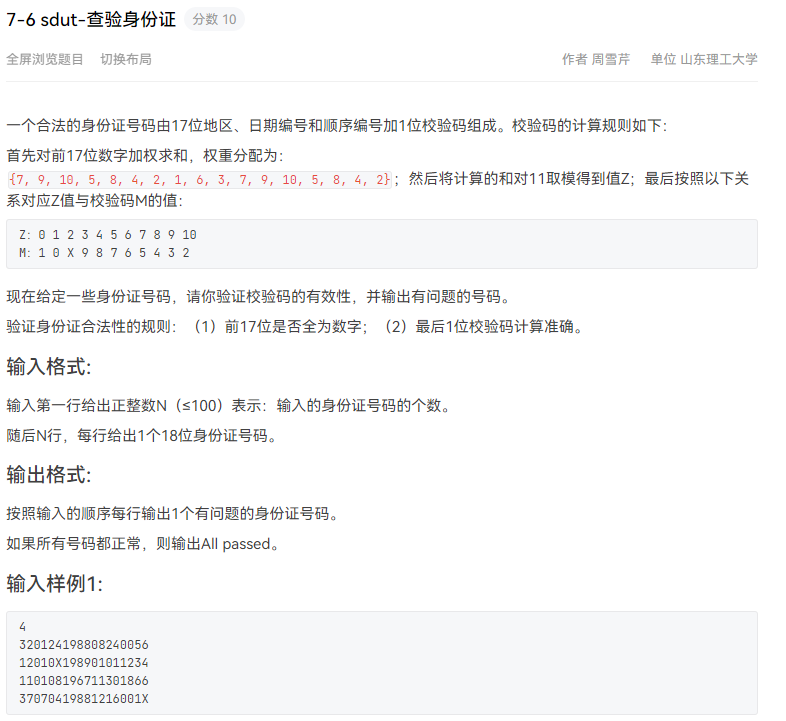
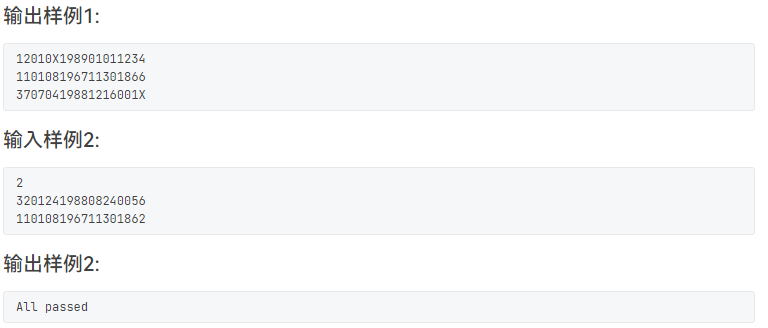
def is_digits(ss):
for s in ss:
if not s.isdigit():
return False
return True
weights = [7,9,10,5,8,4,2,1,6,3,7,9,10,5,8,4,2]
M_codes = ['1', '0', 'X', '9', '8', '7', '6', '5', '4', '3', '2']
wrong_ids = []
n = int(input())
for i in range(n):
id = input()
if len(id) != 18:
wrong_ids.append(id)
continue
if not is_digits(id[:17]):
wrong_ids.append(id)
continue
#计算验证码
total = 0
for j in range(17):
total += int(id[j]) * weights[j]
z = total % 11
if M_codes[z] != id[17]:
wrong_ids.append(id)
if len(wrong_ids) == 0:
print("All passed")
else:
for id in wrong_ids:
print(id)
7. 字典合并
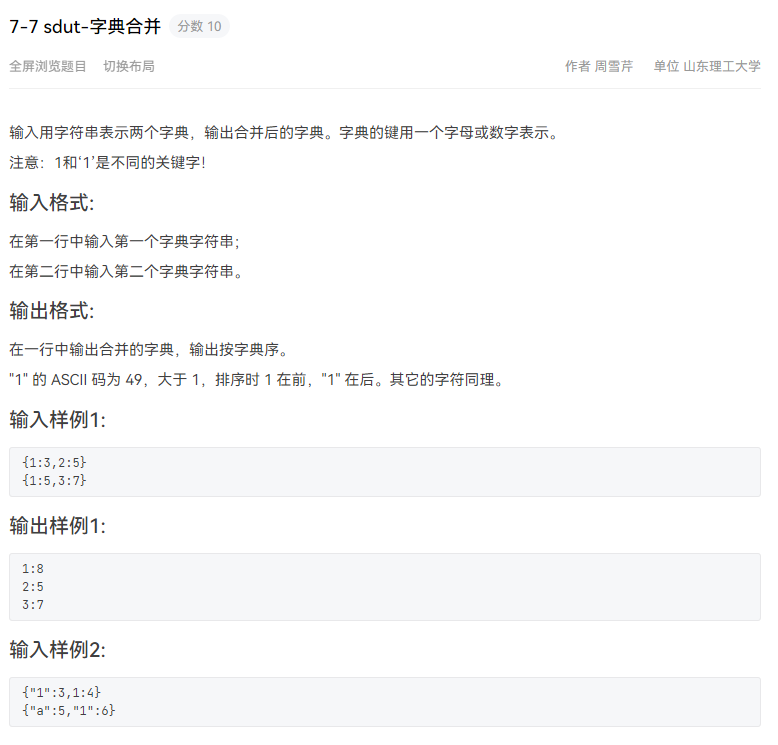
dict1 = dict(eval(input()))
dict2 = dict(eval(input()))
list1 = []
for i in dict1:
if i in dict2:
dict2[i] += dict1[i]
else:
dict2[i] = dict1[i]
for i in dict2:
list1.append(i)
list2 = list(set(list1))
list3 = []
list4 = []
for i in list2:
if isinstance(i, str):
list3.append(i)
list4.append(ord(i))
else:
list4.append(i)
dict3 = {}
for i in dict2:
if isinstance(i, str):
dict3[ord(i)] = dict2[i]
else:
dict3[i] = dict2[i]
for i in sorted(list4):
if chr(i) not in list3:
print("%s:%s" % (i, dict3[i]))
else:
print("'%s':%s" % (chr(i), dict3[i]))
8. 单词统计
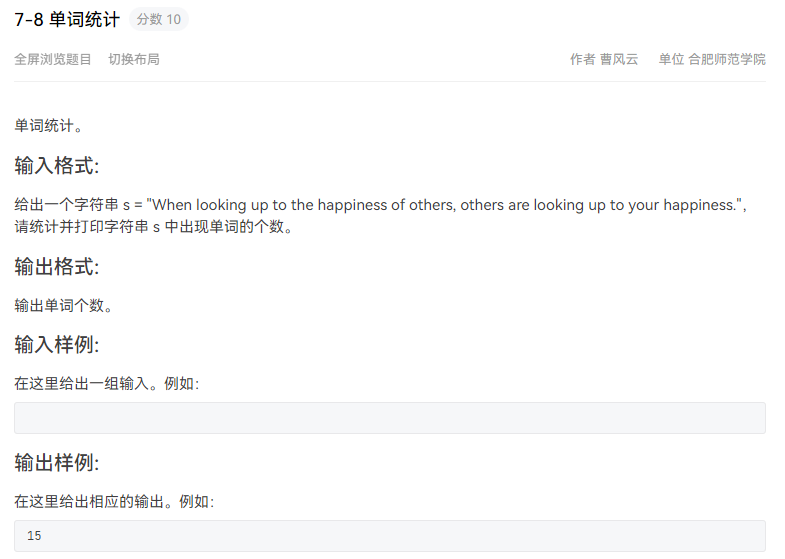
n = input().split()
print(len(n))
9.集合A-B
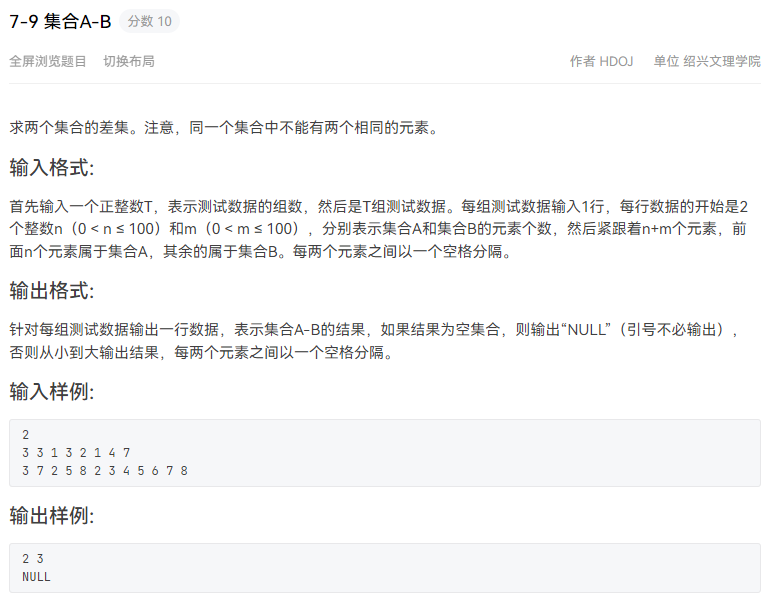
t = eval(input())
for i in range(t):
a, b = [], []
s = list(map(int, input().split(" ")))
n, m = s[0], s[1]
a = s[2:2 + n]
b = s[2 + n:]
# c = [item for item in a if item not in b]
c = set(a)-set(b)
c = sorted(c)
try:
for y in range(len(c) - 1):
print(c[y], end=" ")
print(c[-1])
except:
print("NULL")
10.奇特的四位数
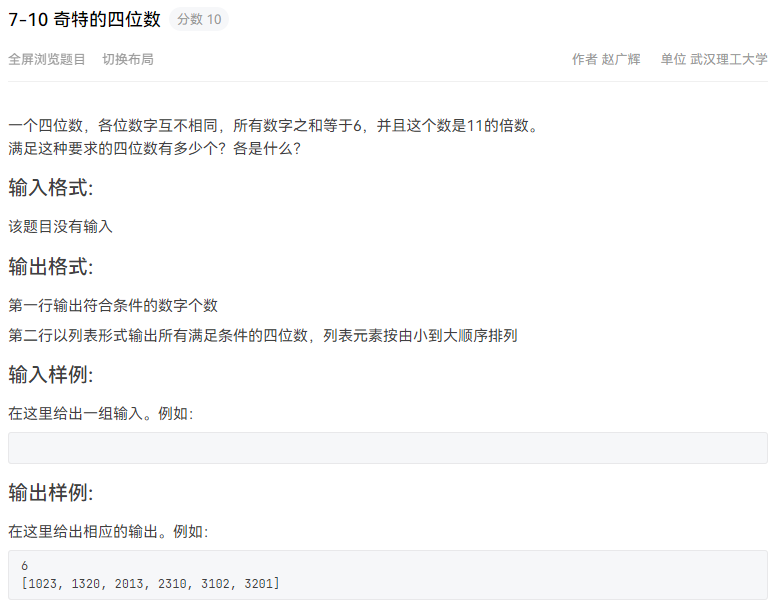
def digitSum(v):
lis = list(str(v))
lis = list(map(int, lis))
return sum(lis)
def digitsame(v):
lis = list(str(v))
lis = list(map(int, lis))
lis1 = list(set(lis))
if len(lis1) == 4:
return True
return False
lis = []
for i in range(1000, 10000):
if digitSum(i) == 6 and i % 11 == 0 and digitsame(i):
lis.append(i)
print(6)
print(lis)
Python 实验四
1. 列表推导生成随机数矩阵
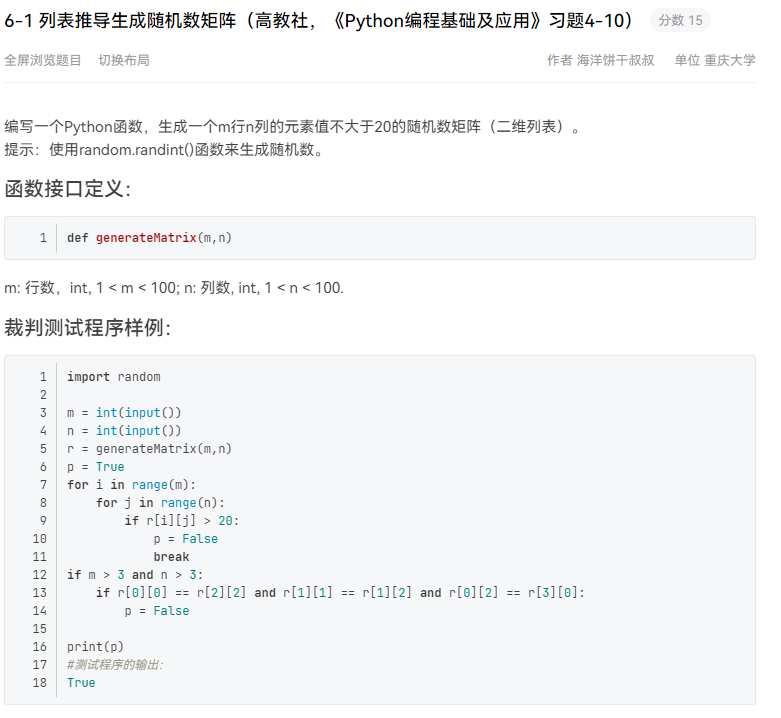
def generateMatrix(m,n):
return [[random.randint(0,20) for x in range(n)] for y in range(m)]
2.整数数位和
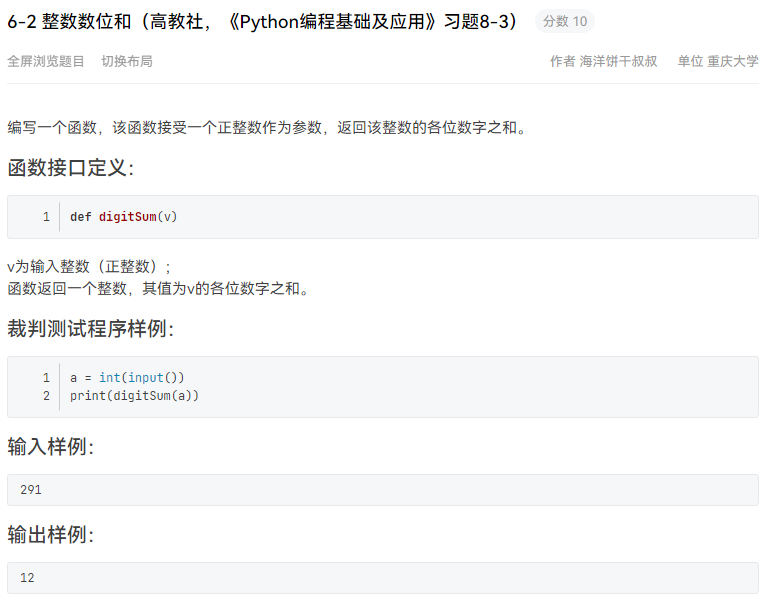
def digitSum(v):
sum=0
while v:
sum+=v%10
v//=10
return int (sum)
4. 编写生成斐波那契数列的函数并调用。
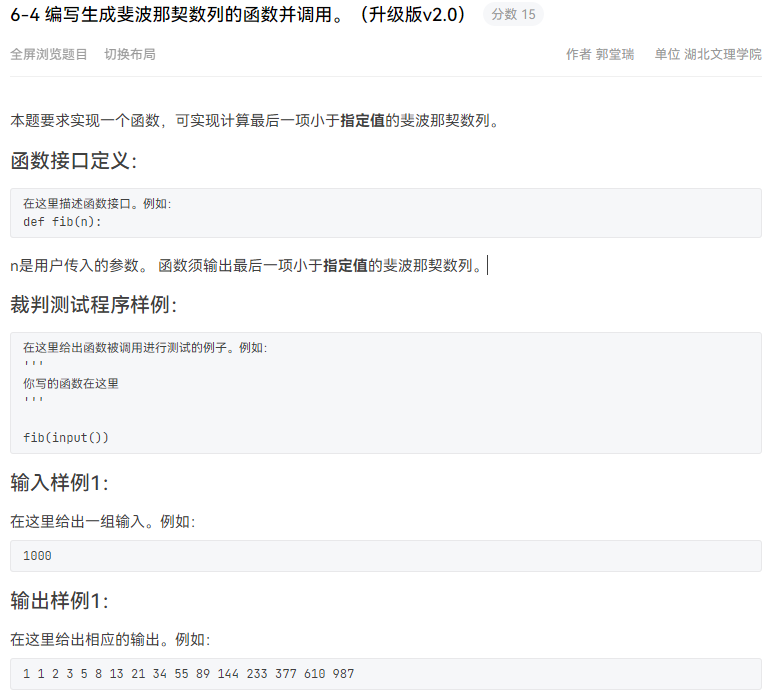
def fib(n):
n=eval(n)
if n < 0:
print("输入数据错误!")
else:
if n>0 and n<3:
print("1 1")
else:
num1, num2, string, i = 1, 1, "1 1 ", 0
while True:
i = i + 1
if i % 2 == 0:
num2 += num1
if num2 > n:
break
string += str(num2) + " "
else:
num1 += num2
if num1 > n:
break
string += str(num1) + " "
print(string)
5.判断素数的函数
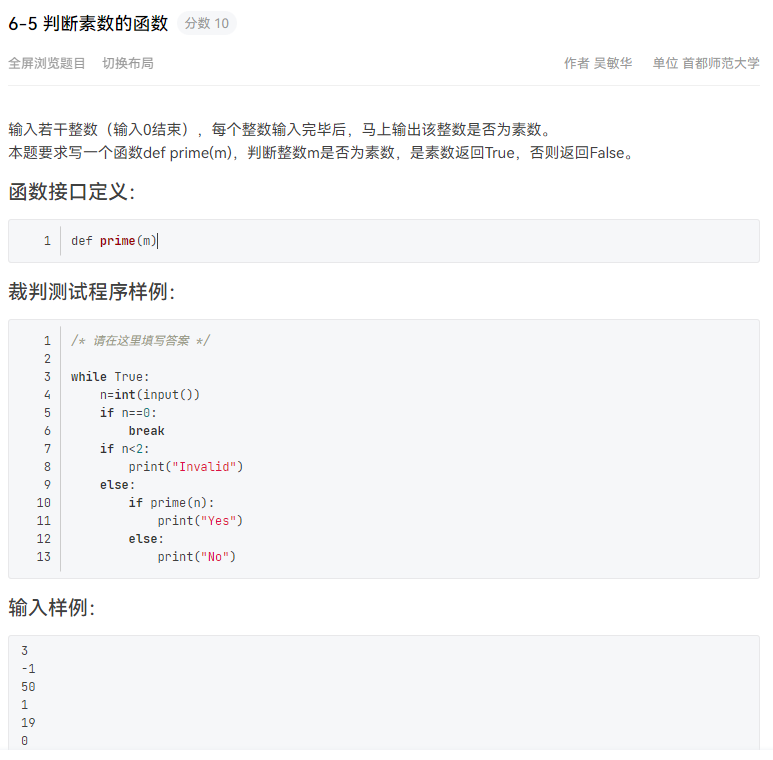
def prime(n):
if n <= 1:
return "1"
num = int(n ** 0.5)
for i in range(2,num + 1):
if n % i == 0:
return False
return True
6.定义并实现身体质量指数类
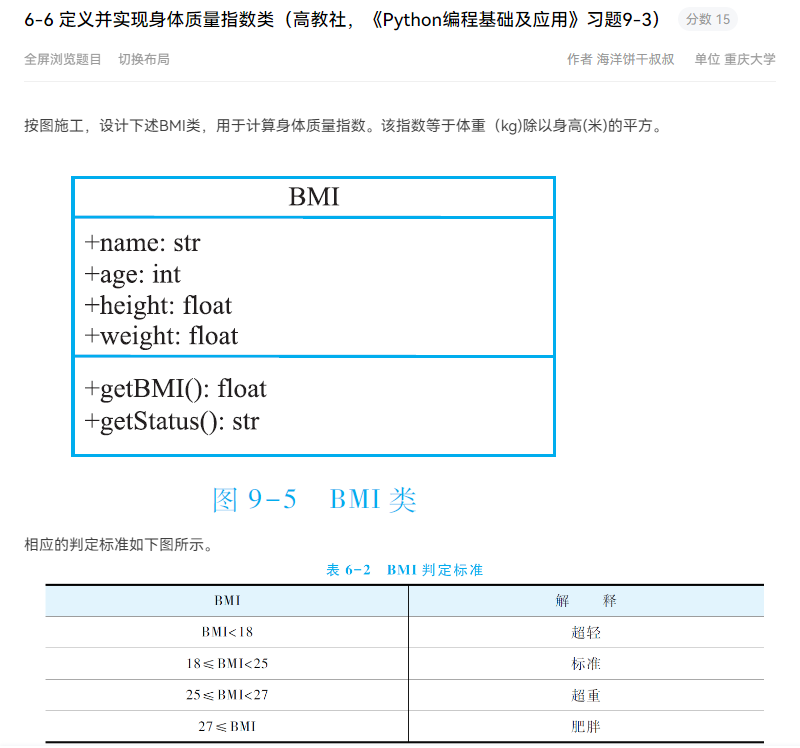
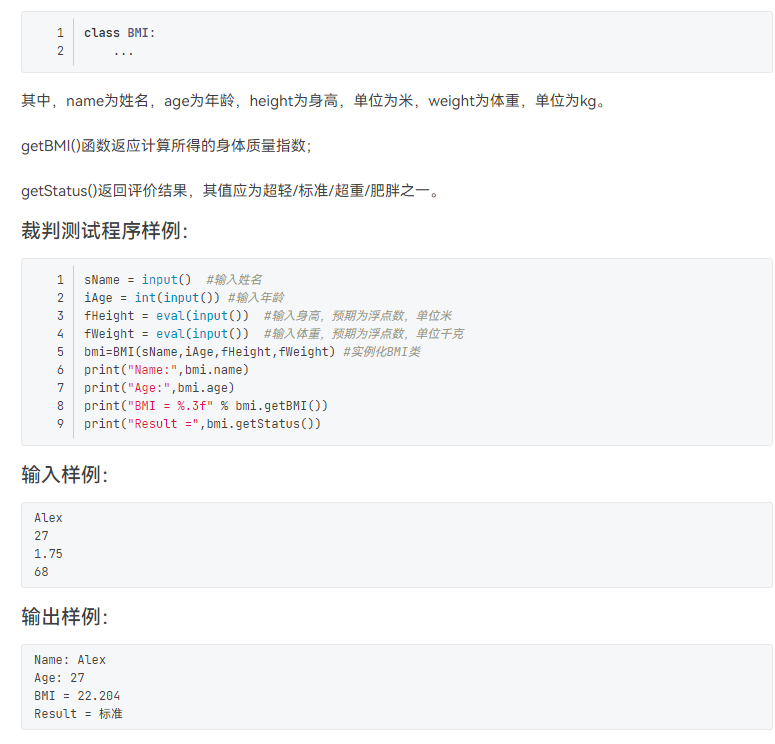
class BMI:
def __init__(self,sName,iAge,fHeight,fWeight):
self.name=sName
self.age=iAge
self.height=fHeight
self.weight=fWeight
def getStatus(self):
m=fWeight/(fHeight**2)
if m<18:
return ("超轻")
elif m>=18 and m<25:
return ("标准")
elif m>=25 and m<27:
return ("超重")
else:
return ("肥胖")
def getBMI(self):
n=fWeight/(fHeight**2)
return n
9.类的定义
class Pet:
def __init__(self,Name,Age):
self.Name=Name
self.Age=Age
def getName(self):
return (self.Name)
def getAge(self):
return (self.Age)
def setName(self,Name):
self.Name=Name
return (self.Age)
def setAge(self,Age):
self.Age=Age
return (self.Age)
def __str__(self):
return self.Name + ' is ' + str(self.Age) + ' age!'
class Fan:
def __init__(self,speed=1,radius=5,color='white',on=False):
self.__speed=speed
self.__radius=radius
self.__color=color
self.__on=on
def getSpeed(self):
if self.__speed==1:
return 'SLOW'
elif self.__speed==2:
return 'MEDIUM'
else:
return 'FAST'
def geton(self):
if self.__on:
return 'on'
else:
return 'off'
def getradius(self):
return self.__radius
def getcolor(self):
return self.__color
def setSpeed(self,speed):
self.__speed=speed
def setOn(self,on):
self.__on=on
def setRadius(self,radius):
self.__radius=radius
def setColor(self,color):
self.__color=color
def __str__(self):
return 'speed ' + str(self.__speed) +'\n' +'color '+self.__color + '\n'+'radius '+str(self.__radius)+'\n'+'fan is '+str(self.geton())
版权声明:本文为qq_48157192原创文章,遵循CC 4.0 BY-SA版权协议,转载请附上原文出处链接和本声明。